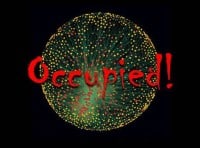
GLOBAL COMMERCE OCCUPIED

Occupy The World strikes at the heart of the global financial system
- Dateline
- 20 October 2012
In a daring attack on the world’s financial systems, the global ‘occupy’ movement yesterday hijacked almost every payment made in the entire world. The transactions totaled billions of euros and sent shivers of panic through the world’s stock markets, governments, banks and cities.
The target of the ‘hacktivists’ was the top 147 multinationals that ‘run the world’ according to a study conducted two years ago. This group is so interconnected and wide spread that they are estimated to control 40% of the global economy.
With 65% of the world’s population now transacting via mobile devices and the world wide web, the scale of the attack renders any military attack insignificant. The effect is dramatic and threatens to halt the flow of funds around the world and bring the planet to a commercial standstill. The debt and funding crisis of 2008 is nothing compared to the panic and fear unleashed yesterday.
Some commentators have likened the event to a financial nuclear attack, affecting every sphere of the global economy. Every stock market has been closed until further notice and emergency meetings are happening in every capital across the world. It’s Armageddon without bombs. We are seeing unprecedented cooperation among arch financial rivals, arch political opponents and even arch military foes.
Never before has the entire world come together and cooperated at this scale, with this level of intensity before. If the attackers can be stopped, the financial devastation unwound and the system holes closed, the world will be better off with the newly established alliances and relationships.
Opponents will have found the value of cooperation instead of rivalry and this may extend to environmental and political solutions where before these were always undermined by opposing vested interests.
But Occupy The World claim they are the true people’s representatives, and appear to have masses of support in many countries. They blame the “1% of fatcat corporations” for the situation, saying that they are acting “in defense of the people.” Analysts say their support will evaporate as the effects of the payment standstill hit home.
Barack Obama, facing an election year, and a key figure in the global task team, is convinced the unprecedented crisis will be resolved in a constructive manner. He has mobilized the world’s best security experts from Google, Amazon, Apple and Microsoft in a network of cloud computing power and has united them in a common purpose around the Google mantra of “do no evil.”
ANALYSIS >> SYNTHESIS: How this scenario came to be
The top 20 of the 147 superconnected companies – New Scientist
1. Barclays plc
2. Capital Group Companies Inc
3. FMR Corporation
4. AXA
5. State Street Corporation
6. JP Morgan Chase & Co
7. Legal & General Group plc
8. Vanguard Group Inc
9. UBS AG
10. Merrill Lynch & Co Inc
11. Wellington Management Co LLP
12. Deutsche Bank AG
13. Franklin Resources Inc
14. Credit Suisse Group
15. Walton Enterprises LLC
16. Bank of New York Mellon Corp
17. Natixis
18. Goldman Sachs Group Inc
19. T Rowe Price Group Inc
20. Legg Mason Inc
Warning: Hazardous thinking at work
Despite appearances to the contrary, Futureworld cannot and does not predict the future. Our Mindbullets scenarios are fictitious and designed purely to explore possible futures, challenge and stimulate strategic thinking. Use these at your own risk. Any reference to actual people, entities or events is entirely allegorical. Copyright Futureworld International Limited. Reproduction or distribution permitted only with recognition of Copyright and the inclusion of this disclaimer.